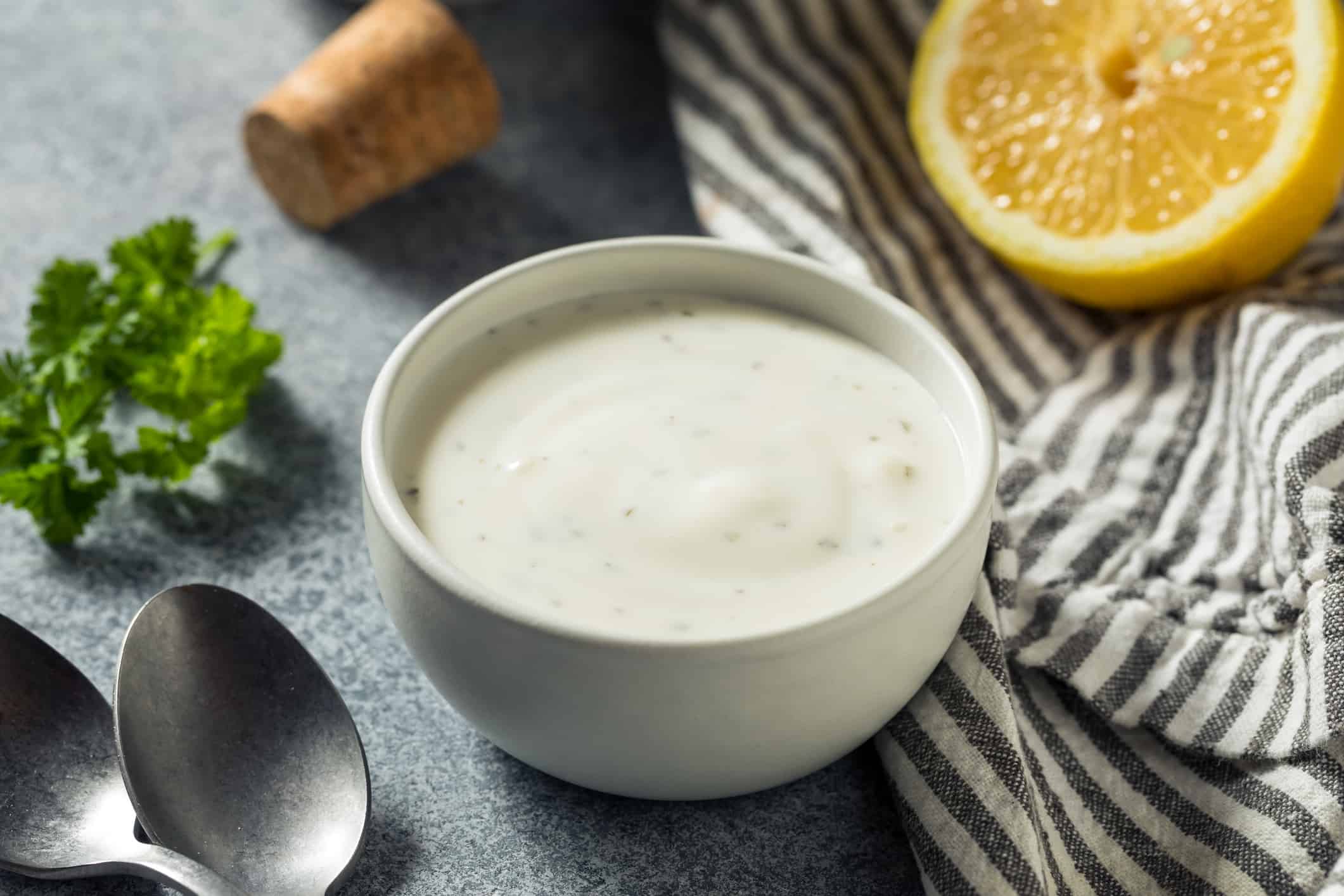Looking for a creamy dip to add to any chicken wing or fried food situation? Welcome to the grand debate of ranch vs. blue cheese dressing. These two dressings share a base of dairy milk to get that rich cream flavor. But they have some crucial differences that set them apart as choice dipping sauces. A lot of their personality comes down to how you pair them. And there are a few recipe variations that might work better for certain meals.
Keep on reading to learn about the major differences in the consideration of ranch vs. blue cheese. We’ll talk about the different recipe variations and learn a little about the history of these iconic dressings. What are the food pairings that make these dips iconic? At the end of this, you’ll be prepared to pick the creamy dressing that will up your chicken wing and fried food game.
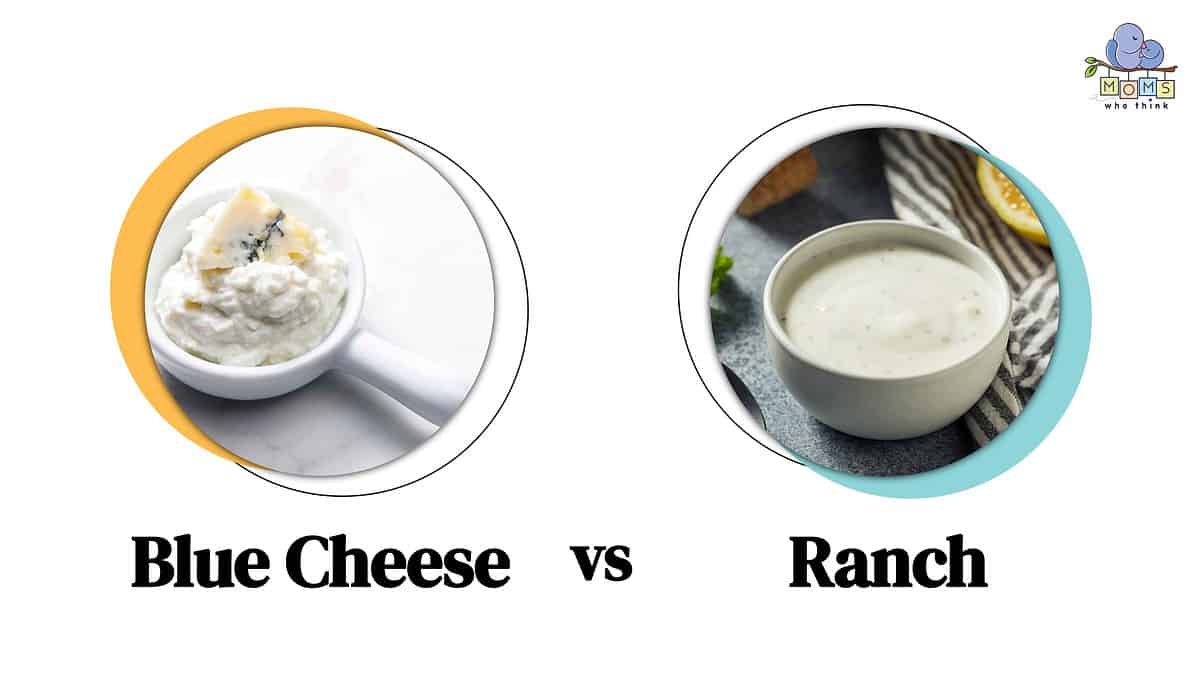
©
Ranch vs. Blue Cheese Dressing: What Is The Difference?
Ranch and blue cheese are similar dressings in that they both have a base of buttermilk. However, the key difference between the two is their added ingredients. Blue cheese dressing is known for its pungent, tangy taste and is made with crumbled blue cheese and vinegar. On the other hand, ranch dressing is creamy and slightly sweet, with herbs like dill, parsley, and chives. Blue cheese dressing is a crumbling, creamy dressing dip while ranch is known for its smooth and herbaceous consistency. Let's take an in-depth look into these dressing's flavor profiles.
Ranch vs. Blue Cheese Nutrition Comparison
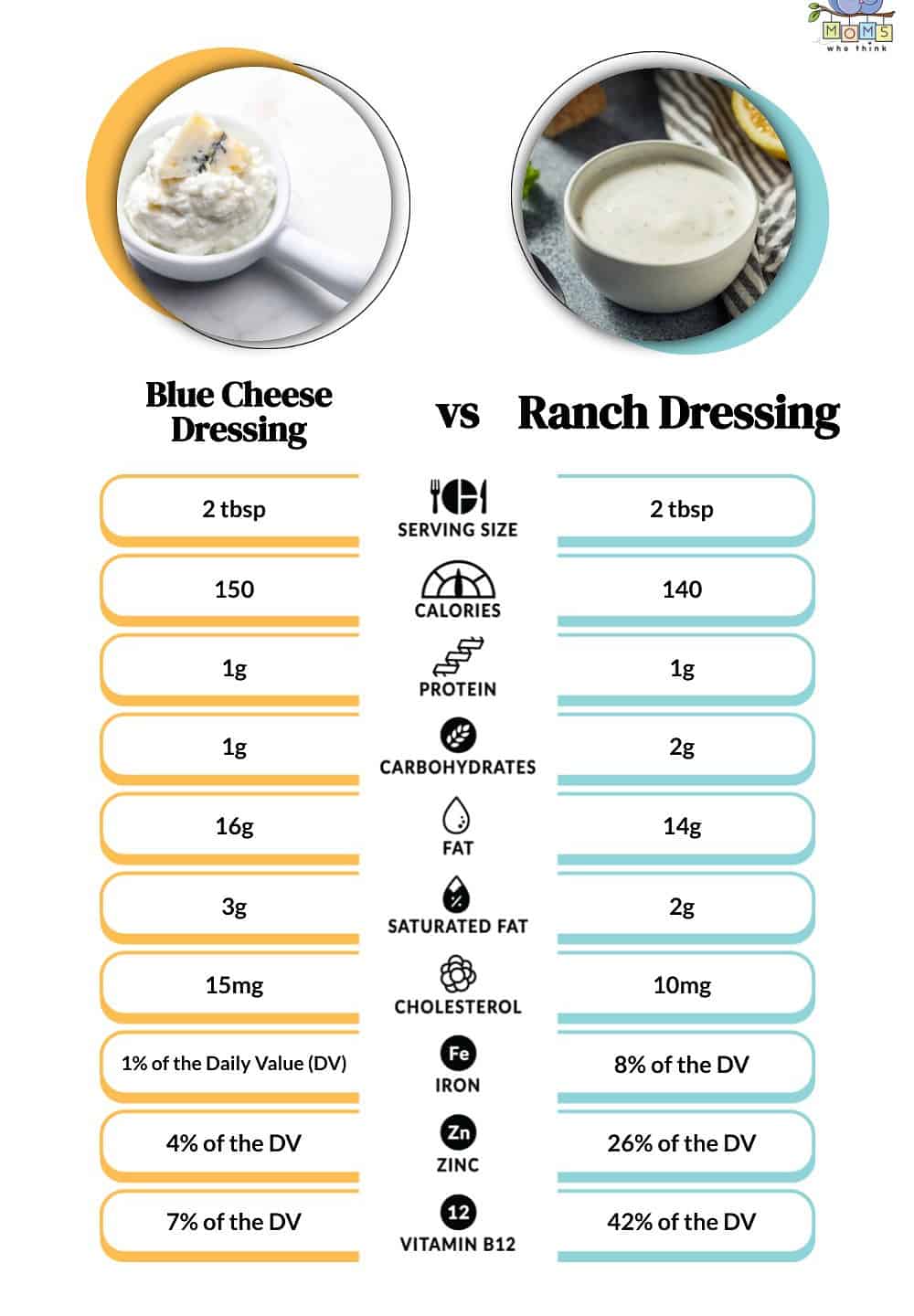
©
The calorie count and nutritional value of ranch come down to its base. There are a few major ranch retailers including the original Hidden Valley as well as Kraft, Newman's Own, and Annies. About 2 tbs of ranch typically contains about 140 calories, less than 1 gram of protein, 14 grams of fat, and about 2 grams of carbohydrates. Many of these brands use soybean oil which can increase the omega-6 fat content in people's diets. Be sure to check out the bottle to decide which store-bought ranch is best for your needs. You can always make your own!
As with ranch, the nutritional value of blue cheese dressing has a lot to do with its base. If you were to substitute mayonnaise for low-fat yogurt, the nutritional value of your creamy dressing would increase in certain nutrients. Blue cheese has its very own nutritional profile that has a lot of positives and some other caloric factors to consider. It has high calcium levels which can help build bone density, and can help to manage levels of visceral fat in the body!
There is also a compound called spermidine in blue cheese that can combat the risk of cardiovascular disease! Blue cheese can have slightly more protein depending on how much cheese is added but also gets most of its calories from fat macronutrients. Blue cheese also contains vitamins and minerals like phosphorus, selenium, and riboflavin.
What is Ranch?
Ranch dressing is a combination of buttermilk and sour cream, and sometimes mayonnaise. Add spices and herbs are added to create that iconic ranch flavor. In its dry form, it is a seasoning of all those spices minus the cream for longevity and preservation.
History and Origin
The New York Times considers ranch the ultimate American dressing. It was invented in the 1950s by a plumber named Steve Henson. Henson would bring the dressing in its dry form to jobs around the states. When combined with buttermilk, sour cream, and mayonnaise it created the ultimate creamy dressing. The dressing was so popular that Henson and his wife began to package the dry ingredients for mail-order purchases. The name came from the Hidden Valley Ranch where Henson's family lived and worked to build the ranch dressing empire. Modern-day ranch is commonly used as a dip for french fries and pizza, chicken wings, wedge salad, and potato salad. You can also try out Cool Ranch Doritos chips!
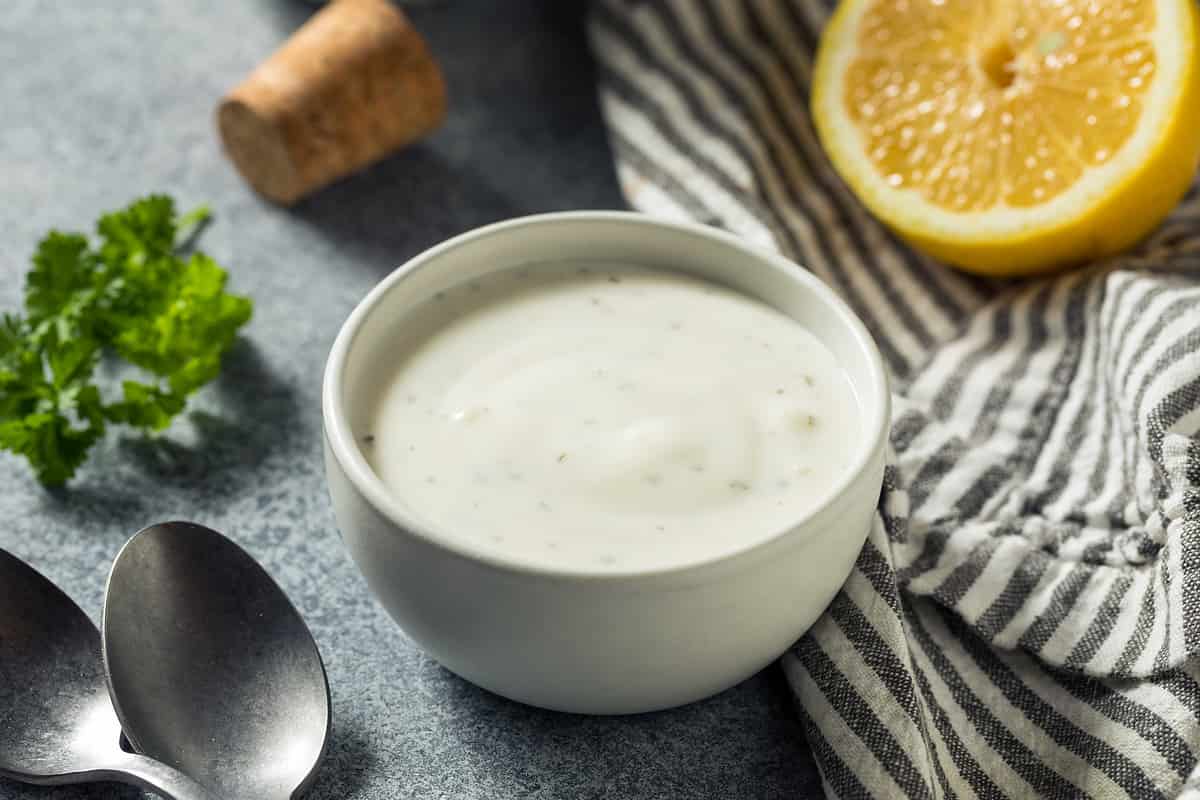
©iStock.com/bhofack2
How Ranch Dressing Is Made
Historically, Ranch was just its dry ingredients. Now, preserved in jars and sold on the shelves of the supermarket, it is a creamy and delicious dip option. It starts with buttermilk, sour cream, yogurt, or possibly some mayonnaise for peak creaminess. The next step is to add herbs like parsley, thyme, chives, and dill along with onion and garlic salts, powders, and black pepper. Finally, mix it in and stir it up to form the creamy salad dressing that we know and love today.
Popular Uses
As we've mentioned, ranch is a pretty versatile dressing. It is used in salads, mixed and wedged! Great on chicken wings, and for dipping all the fried foods, blue cheese dressing can be mixed into macaroni and potato-based dishes. And in a controversial move, it's a great dip and topping for pizza! The possibilities are endless, just use your imagination and grab some creamy ranch dressing.
What is Blue Cheese Dressing?
Blue cheese dressing is also a buttermilk-based dressing that comes with the added tang of blue cheese. Blue cheese has a sharp, bitter, and mildly salty flavor that comes from the edible culture of mold that gives this cheese its spectacular flavoring. Combine this cheese with a creamy agent and you get a rich and heavy dressing that has made its mark in the food industry.
History and Origin
According to Taste Atlas, the earliest recorded recipe for Blue Cheese dressing is in the 1918 Fannie Farmer's Cookbook. It appeared again in 1928 in the Edgewater Hotel Salad Book. Blue cheese dressing was truly popularized in The Joy of Cooking by Irma Rombauer which was released in the 1930s. That means that in the ranch vs. blue cheese dressing debate, blue cheese dressing predates ranch by over 30 years!
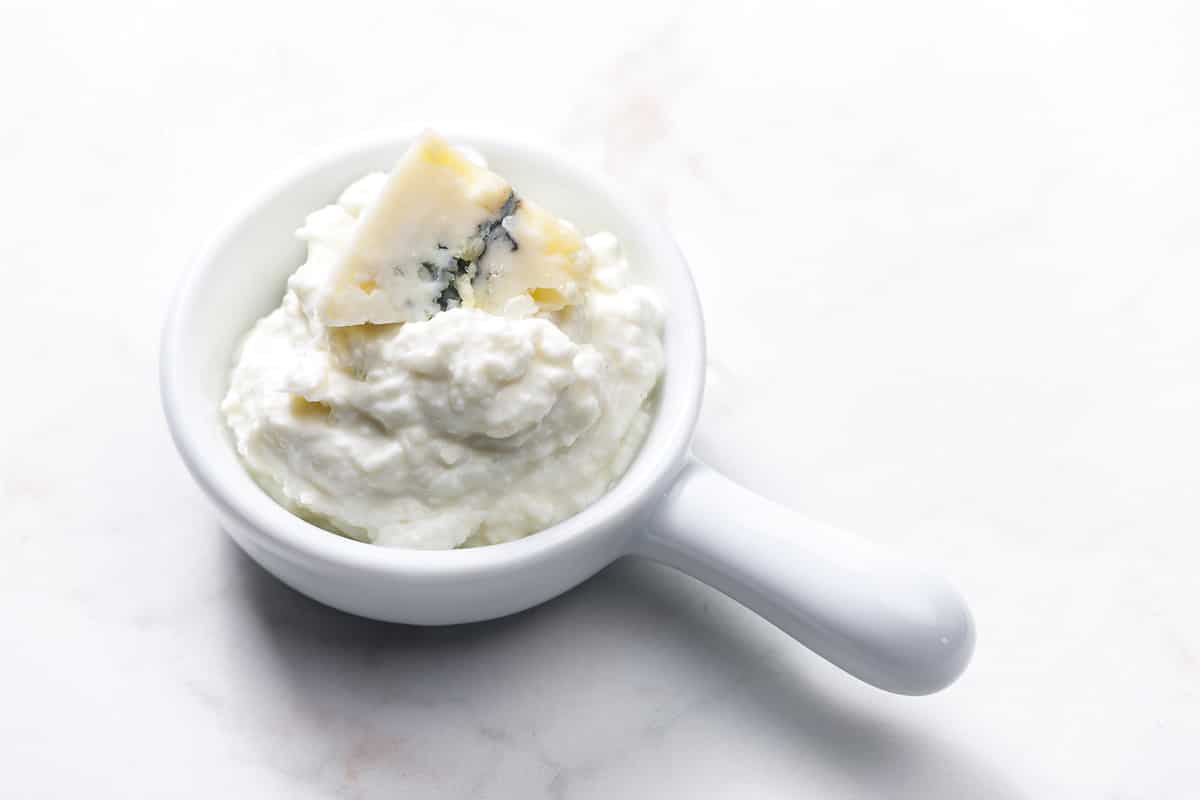
©iStock.com/phbcz
How Blue Cheese Dressing Is Made
Blue cheese dressing is a combination of blue cheese and buttermilk. Once this base is thoroughly mashed up (but not too combined, as you want that chunky texture), you'll add in sour cream and mayonnaise, salt, pepper, vinegar, sugar, and garlic powder. Sound like a familiar recipe? No wonder the ranch vs. blue cheese debate exists!
Popular Uses
Blue cheese dressing is a classic salad dressing and dipping sauce. Cooking-wise, it pairs well with fried foods, chicken wings, burgers, other meats, or fresh-cut vegetables. All Recipes recommends using it in recipes like lasagna, and cheesy pastas. It is also a stellar addition to baked vegetable dishes like stuffed mushrooms! Blue cheese is a tangy and wonderful flavor choice for many meals, add some creamy goodness to your next one!
Possible Alternatives To Ranch or Blue Cheese Dressing
Because these two dressings have some similarities, it would be easy to substitute yogurt or non-dairy/alternative milk products for the creamy base of the dressings. You can play around with the spices and if you want a different cheese, feta, aged cheddar cheese, and goat cheese can all provide that tangy flavor without the blue, yet edible and healthy, mold factor.
Are Ranch and Blue Cheese Dressing The Same Thing?
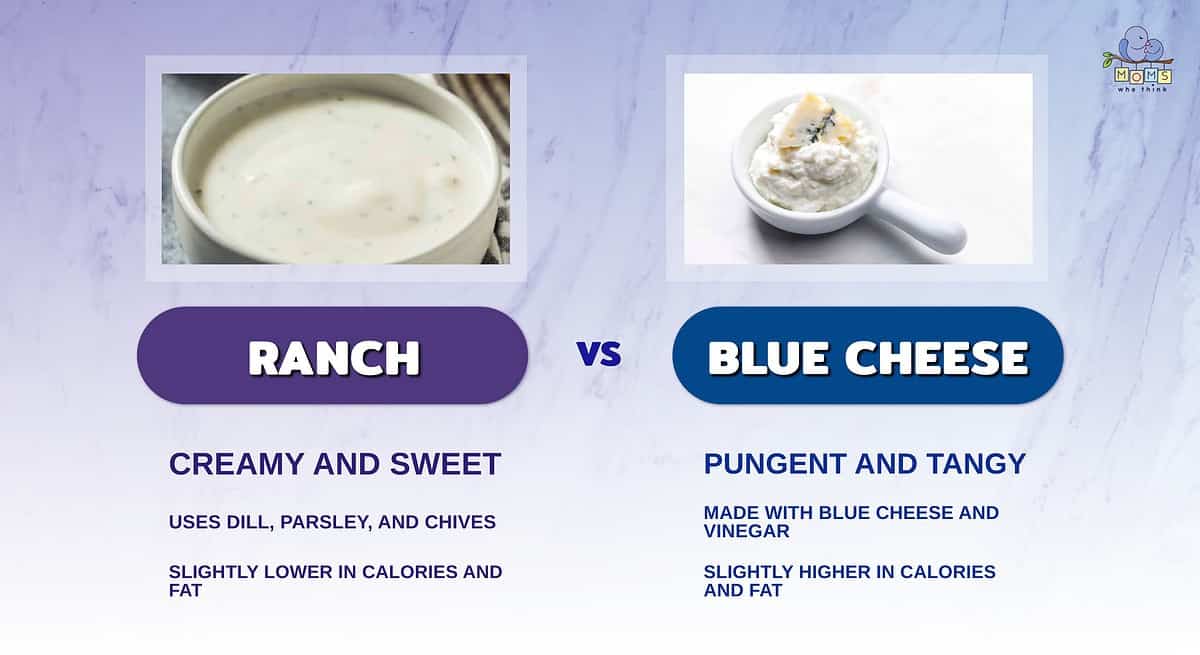
- Ranch has a creamy consistency and sweet taste, while blue cheese dressing has a pungent and tangy taste.
- The use of vinegar in blue cheese dressing is what gives this dressing its distinct tanginess. Ranch makes good use of dill, parsley, and chives to get its popular and recognizable taste.
- There aren't too many nutritional differences between ranch and blue cheese dressing, but ranch is slightly lower in calories and fat.
In the ranch vs. blue cheese dressing debate, one thing is clear – they are not the same thing. They have a nearly identical creamy base and sometimes the herbs and spices overlap but their main difference is the addition of blue cheese in blue cheese dressing as well as how that impacts the texture and consistency. Ranch is a smooth and creamy affair while blue cheese packs and crumbly punch of flavor.
Looking for a delicious recipe to try? Check out this Texas Ranch Chicken Casserole:
PrintTexas Ranch Chicken Casserole
- Yield: 8 servings 1x
Ingredients
1 large onion, finely chopped
2 celery ribs, finely chopped
1 medium green pepper, finely chopped
1 medium sweet red pepper, finely chopped
1 Tablespoon canola oil
1 garlic clove, minced
3 cups cubed cooked chicken breast
1 can (10¾ ounces) reduced-fat reduced-sodium condensed cream of celery soup, undiluted
1 can (10¾ ounces) reduced-fat reduced-sodium condensed cream of chicken soup, undiluted
1 can (10 ounces) diced tomatoes and green chilies, undrained
1 Tablespoon chili powder
12 corn tortillas (6 inches), cut into 1-inch strips
2 cups (8 ounces) shredded reduced-fat cheddar cheese, divided
Instructions
1. In a large nonstick skillet coated with cooking spray, sauté the onion, celery, and peppers in oil until crisp-tender.
2. Add garlic; cook 1 minute longer.
3. Stir in the chicken, soups, tomatoes, and chili powder.
4. Line the bottom of a 3-qt. baking dish with half of the tortilla strips; top with half of the chicken mixture and 1 cup cheese. Repeat layers. Bake, uncovered, at 350° for 30-35 minutes or until bubbly.
Nutrition
- Serving Size: 1 cup
- Calories: 329
- Sodium: 719mg
- Fat: 12g
- Saturated Fat: 5g
- Carbohydrates: 31g
- Fiber: 3g
- Protein: 26g
- Cholesterol: 65mg
The image featured at the top of this post is ©iStock.com/bhofack2.
